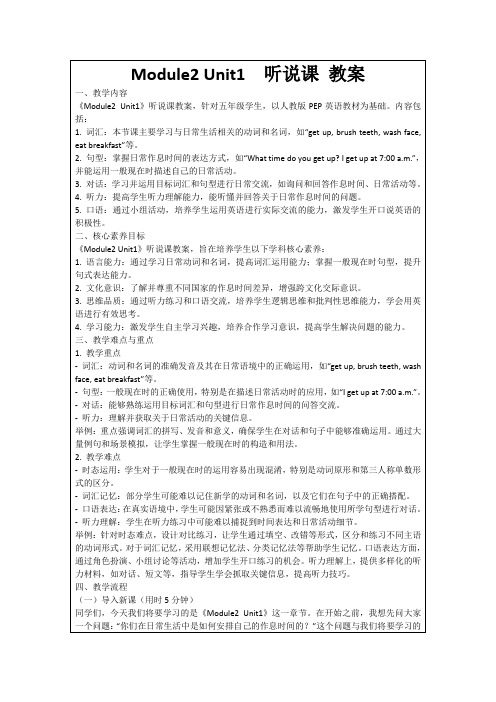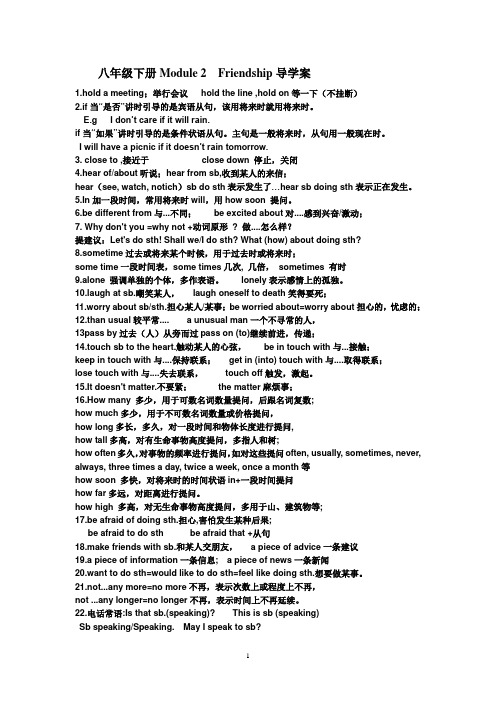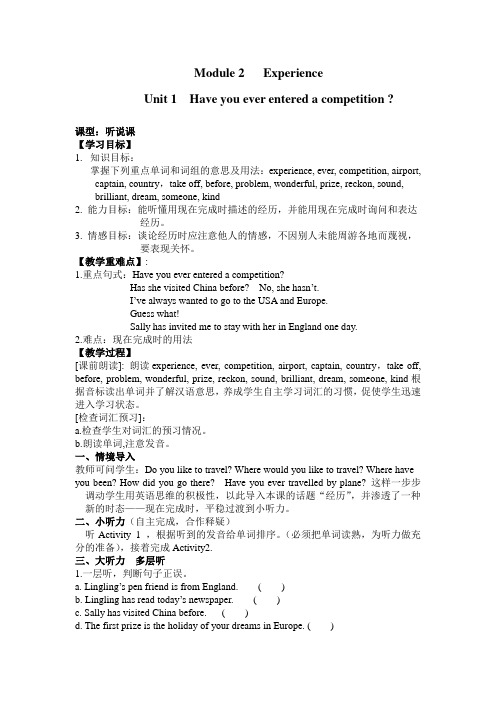第2模块导学案——听说学案
Unit2听力导学案

外研版高二英语Unit2.Onwards and upwards听力导学案一、单词预习(P23P25)1.motivation_______________________2.deadline_______________________3.support_______________________4.nosy_______________________5.tough_______________________6.calm_______________________7.instead_______________________8.fantastic_______________________9.spirit_______________________10.March_______________________11.up late_______________________12.in trouble_______________________13.turn over_______________________14.to be honest_______________________15.proud of_______________________16.fair and square_______________________17.wellknown_______________________18.cucumber_______________________二、Listen to the conversations and match the expressions to their meanings.A.not lift a fingerB. a wet blanketC.an eager beaverD.drag one’s feetE.turn over a new leafF.cool as a cucumber 1.to change your life by starting to be a better person orstopping a bad habit2.some one who is extremely enthusiastic and enjoysworking extremely hard3.to not make any effort4.very calm and relaxed, especially in a difficult situation5.to do something very slowly because you do not reallywant to do it6.someone who refuses to join in, or wants to stop otherpeople having fun三、Listen to the conversation and choose the best answer.1.Who was the winner in the final school petition?A.JackB. DaweiC. Lin Yujing2.How about Dawei’s trip to Beijing?A.NiceB. BoringC. Tiring3.Who is Lin Yujing?A.Dawei’s motherB. Dawei’s sisterC. Dawei’s classmate4.That will be another petition in_____.A.MarchB. MayC. January5.What Jack advised Dawei to do next?A.practise with Lin YujingB. practise aloneC. give up the petition四、Listen to the conversation and fill in the blanks.Jack: Hi, Dawei, are you OK?Dawei:Yeah, I am all right I suppose.Jack: OK. I don’t mean to be . But are you sure? You look down.Dawei:I couldn’t be better .Jack: That is what I thought. Why don’t you tell me what’s up?Dawei:Well, I took part in a national English speaking petition in Beijing, and I finished it in the last place. Jack: Oh, really,I am so sorry to hear that.I am sure you did your best though.Dawei:I did, it wasn’t good enough. The other kids were just better than me.Jack: But you must have been very good to get in the petition. You should be yourself.Dawei:Well, there was a petition in school first. It was held to see who would going to national petition. I want that, but... Jack: There you go. You have to be sad. You are the best English speaker at school.Dawei:That is the problem. I don’t think I am. I think Lin Yuqing is better than me, and she should has gone to Beijing of me.Jack: Who’s Lin Yuqing?Dawei:She’s a girl in my class. When we did the school petition. We were the top two students. The final school petition was between me and her. The winner would go to Beijing.Jack: Ok. But, you won . Why are you so upset?Dawei:I think I was just lucky. Lin Yuqing is much better at English than I am. If she has gone to the national petition. She would have won. Our school would have bee . And everyone would have been happy, instead I went to Beijing and lost. Jack:Oh, Dawei, you can’t think like that. Who knows what would have happened. I know this is hard for you, but you should . I mean, did you have a good time in Beijing?Dawei:Yes, I supposed I did. It’s really a exciting city and I met some people.Jack:There you go. You had a good time. And I am sure your parents are proud of you.Dawei:They are, yes. It was a greatest experience. But I just wished I have won.Jack:You can’t win everything Dawei. You are the best in our school and that means a lot. Perhaps one day, if you study hard you can be the best in the country.Dawei:Yes, I haven’t thought of that. That will be another petition in March. Perhaps I can try again then.Jack:That’s the. I know an English saying:“If at first you don’t succeed, try, try again.”Dawei:Yes, that’s a good advice. Thanks Jack. You’ve really cheered me up. I feel a lot better now.Jack:No problem. And why don’t you talk to Yujing? You can practise together.Dawei:Yes, I will do that. Thank you so much.。
Unit 2(听说版教案5课时)【人教八上英语备课】

Unit 2 How often do you exercise(教案5课时)【2023秋人教八上英语高效实用备课】本单元属于“人与自我”范畴,涉及“丰富、充实、积极向上的生活”。
Section A是基本语言内容的积累和学习,这一部分引导学生通过本课的语言素材进行看图说话、句型演练、日常交际,通过对话表演等形式使学生能够正确地描述所参与的活动以及参与活动的频率,从而能围绕这一话题展开简单的口语交际。
Section B是知识的扩展和语言的综合运用,是在Section A的基础上,锻炼学生能够自如地谈论自己的生活习惯。
这些内容都是与学生的日常生活紧密相关的,因此在这一课题的教学过程中,应紧密联系学生生活实际,采用多种方式,以说为主,配合听的练习,最终以对话为途径,掌握本课题的中心语句。
这对于学生学会运用简单的英语进行交际和交流,提高学生的综合能力,特别是口语交际能力很有帮助。
学生通过对本单元的学习,可以引导自己养成良好的生活习惯和学习习惯,从而合理安排自己的各项学习与生活,享受丰富多彩的校园生活。
1.能够运用一般现在时讲述自己的生活习惯。
2.能够熟练运用频度副词。
3.让学生理解课文中各个知识链的意义,并学会制作或填写调查表。
4.激发学生的学习热情与兴趣,体验用英语与人交流的乐趣。
1.重点:(1)能正确区分并使用频度副词。
(2)能够列举几条好的生活习惯。
2.难点:掌握一般现在时的用法并能够灵活运用到英语句子中。
导入一视频导入在平时的学习生活中,拍摄一些学生在周末所做的活动的视频,在课堂上播放,让学生观看视频中有几种周末活动,并引导学生进行问答训练。
T:What do you usually do on weekends?S1:I usually play basketball.S2:I often go shopping.S3:I sometimes help my parents with housework.…导入二情境导入创设一些情境:让学生做动作,比如读书、购物、看电视、锻炼、做家务、看电影、上网等,让其他学生猜这是什么活动,然后导入新课。
Module2Unit2听说课第二课时学历案-2023-2024学年八年级英语上册

学后反思
教师评价
Shenzhen
Your home town
达标检测
翻译
1.相当好2.事实上3.在20世纪80年代4.和...一样5.一千万
6. ...的人口有多少?7.超过8.许多其他城市9.想要做某事10.13.30年前14.变得重要
作业布置
1、熟记短语,知识点以及课文重点句子(必做)
学历案设计模板
学习主题
八上Module 2 Unit1 It’s taller than many other buildings.
课型
听说课
课时
第二
课时
设计者
课标要求
课标摘录:
课标摘录
义务教育《英语课程标准》语言技能四级标准:
听:能听懂简单的指令完成任务。
说:1.能引出话题并进行几个话轮的交谈;
2.能在教师的指导下参与角色表演等活动;
1) in fact表示“事实上”。
e.g. In fact, Taiwan is a part of China.
事实上,台湾是中国的一部分。
2) in the 1980s表示“在20世纪80年代”。
结构为“in the +年+ s”。
e.g. in the 1930s在20世纪30年代
3. Some day it will bee as busy as Hong Kong, I’m sure.
5. Remember to visit the Diwang Tower.
记得来参观帝王大厦。
remember to do sth.“记得做某事”,表示这件事还没有做。
remember doing sth.“记得做过某事”,表示曾经做过某事
Module2Unit1听说课教案

-听力理解:学生在听力练习中可能难以捕捉到时间表达和日常活动细节。
举例:针对时态难点,设计对比练习,让学生通过填空、改错等形式,区分和练习不同主语的动词形式。对于词汇记忆,采用联想记忆法、分类记忆法等帮助学生记忆。口语表达方面,通过角色扮演、小组讨论等活动,增加学生开口练习的机会。听力理解上,提供多样化的听力材料,如对话、短文等,指导学生学会抓取关键信息,提高听力技巧。
学生小组讨论的环节,大家围绕一般现在时在生活中的应用展开讨论,气氛热烈。但我也发现,部分学生在提出观点时,语言表达不够准确,逻辑性不强。针对这一点,我将在今后的教学中加强对学生思维能力和语言组织能力的训练。
通过这次教学反思,我深感教学是一门需要不断探索和实践的艺术。只有不断学习、反思和改进,才能更好地为学生服务,提高他们的英语素养。在接下来的教学中,我会继续努力,以期达到更好的教学效果。
3.重点难点解析:在讲授过程中,我会特别强调一般现在时的动词形式变化和日常用语的正确使用。对于难点部分,我会通过对比和例句来帮助大家理解。
(三)实践活动(用时10分钟)
1.分组讨论:学生们将分成若干小组,每组讨论一个与日常活动相关的话题,如“早上起床后的习惯”。
2.实验操作:为了加深理解,我们将进行一个简单的角色扮演活动。这个活动将演示如何在实际对话中使用一般现在时。
-听力:理解并获取关于日常活动的关键信息。
举例:重点强调词汇的拼写、发音和意义,确保学生在对话和句子中能够准确运用。通过大量例句和场景模拟,让学生掌握一般现在时的构造和用法。
2.教学难点
-时态运用:学生对于一般现在时的运用容易出现混淆,特别是动词原形和第三人称单数形式的区分。
MODULE 2导学案

八年级下册Module 2 Friendship导学案1.hold a meeting;举行会议hold the line ,hold on等一下(不挂断)2.if当“是否”讲时引导的是宾语从句,该用将来时就用将来时。
E.g I don’t care if it will rain.if当“如果”讲时引导的是条件状语从句。
主句是一般将来时,从句用一般现在时。
I will have a picnic if it doesn’t rain tomorrow.3. close to ,接近于close down 停止,关闭4.hear of/about听说;hear from sb,收到某人的来信;hear(see, watch, notich)sb do sth表示发生了…hear sb doing sth表示正在发生。
5.In加一段时间,常用将来时will,用how soon 提问。
6.be different from与...不同;be excited about对....感到兴奋/激动;7. Why don't you =why not +动词原形? 做....怎么样?提建议:Let's do sth! Shall we/I do sth? What (how) about doing sth?8.sometime过去或将来某个时候,用于过去时或将来时;some time一段时间表,some times几次, 几倍,sometimes 有时9.alone 强调单独的个体,多作表语。
lonely表示感情上的孤独。
ugh at sb.嘲笑某人,laugh oneself to death笑得要死;11.worry about sb/sth.担心某人/某事;be worried about=worry about担心的,忧虑的;12.than usual较平常.... a unusual man一个不寻常的人,13pass by过去(人)从旁而过pass on (to)继续前进,传递;14.touch sb to the heart.触动某人的心弦,be in touch with与...接触;keep in touch with与....保持联系;get in (into) touch with与....取得联系;lose touch with与....失去联系,touch off触发,激起。
初二上Module 2-导学案

Module 2 ExperienceUnit 1 Have you ever entered a competition ?课型:听说课【学习目标】1.知识目标:掌握下列重点单词和词组的意思及用法:experience, ever, competition, airport, captain, country,take off, before, problem, wonderful, prize, reckon, sound,brilliant, dream, someone, kind2. 能力目标:能听懂用现在完成时描述的经历,并能用现在完成时询问和表达经历。
3. 情感目标:谈论经历时应注意他人的情感,不因别人未能周游各地而蔑视,要表现关怀。
【教学重难点】:1.重点句式:Have you ever entered a competition?Has she visited China before? No, she hasn’t.I’ve always wanted to go to the USA and Europe.Guess what!Sally has invited me to stay with her in England one day.2.难点:现在完成时的用法【教学过程】[课前朗读]: 朗读experience, ever, competition, airport, captain, country,take off, before, problem, wonderful, prize, reckon, sound, brilliant, dream, someone, kind根据音标读出单词并了解汉语意思,养成学生自主学习词汇的习惯,促使学生迅速进入学习状态。
[检查词汇预习]:a.检查学生对词汇的预习情况。
b.朗读单词,注意发音。
一、情境导入教师可问学生:Do you like to travel? Where would you like to travel? Where have you been? How did you go there? Have you ever travelled by plane? 这样一步步调动学生用英语思维的积极性,以此导入本课的话题“经历”,并渗透了一种新的时态——现在完成时,平稳过渡到小听力。
高中英语同步教案:ModuleNoDrugs外研版必修听说
2014-2015学年高中英语(云南)同步教案:Module 2 No Drugs(外研版必修2)听说外研版高中必修二Module2 No Drugs Listening and Vocabulary Speaking教学案例设计课题名称:Module2 No Drugs ---Listening and Vocabulary & Speaking 教材版本:外研版授课时间:45分钟一、学生分析班上的学生刚从初三升入高一的学习时,由于进行全英教学,有些学生还不是很适应,特别是择校学生,在听说方面有比较大的困难。
由于初高中对学生的要求不同,学生普遍的问题是词汇量比较少,用中文思维,不知如何用英语表达等,但学生对英语学习的热情还是比较高涨,兴趣较浓。
学生对本课时的话题No Drugs有所了解,在前一课的Reading and vocabulary中对吸毒及其危害的词汇接触了一些,但还是比较有限。
因此在教此课前布置学生通过媒体网络上了解相关的背景信息。
在课堂教学中,努力激发学生参与教学活动的热情,积极思考,相互讨论,共同协作。
二、教材分析本课时所教的是外研版高一上学期使用的必修⑵Module2中的Listening and vocabulary和speaking部分的内容,是本模块的第三课时。
要求通过听的活动了解和学习有关吸毒和犯罪的词汇,培养表达结果,作总结逻辑思维能力和获取信息的能力。
Speaking讨论抽烟带来的危害,为了与听力部分的内容衔接,我对Speaking中的话题作个修改,把讨论吸烟的危害改编成毒品的危害。
在这节听说课之前,学生学习了Reading and vocabulary,通过阅读文章,已经掌握了部分抽烟、吸毒及其危害的词汇,本课时由复习旧课入手,引入新课的新词汇,并以听说为主线,对吸毒这一主题进行延伸和拓展。
三、教学目标本模块是通过学习表达吸毒及其危害的词语和其它语言形式,养成良好生活习惯,教育学生关爱社会,关爱他人,远离毒品。
高中英语2Module2NoDrugsbook2module2听说导学案
Book2 module2 listening and speaking四川省金堂中学何婷Part1.自主学习(6mins)activity break the law burglary connection crime criminal estimate illegal ratio shoplifting shopping center treatment1.单词连线criminal somewhere that you can buy things.Estimate someone who breaks the law.Ratio the relationship is showed by two numbers.shopping centre to have an general idea of the value of sth.2.短语理解1, I don’t have enough money to pay for the house. Pay for意义_________2, You will get into trouble if you break the law. Get into trouble意义______3.填空完成句子Taking drugs is a very dangerous___________(活动),because it has a direct ______(联系)with_______(犯罪). The drug addicts will do something_______(违法的),such as_________(逛商店的偷盗行为),________(入室盗窃).So most of them will end up in prison. If they don’t receive any_________(治疗), they will die.Part 2 交流展示(4mins)Part 3训练反馈(12mins)听力技巧:1.数字的技巧(微课) 2.放松心情,集中注意力。
UNIT2LOOKINTOTHEFUTUREUsingLanguage听说课(导学案)高二英语系列(
UNIT2 LOOK INTO THE FUTUREUsing Language听说课导学案课前导学区1.2.adj.人工的;人造的;假的3.vt.克隆;以无性繁殖技术复制n.克隆动物(或植物)4.vt.预测;预言;预料5.n.预测;预言6.vt.&n.预测;预报7.n.职业;占领8.vt.反对;抵制;阻挠9.adv.因此;由此10.vi.&vt.(使)停止;终止11.adj.已死的;亡故的12.n.不存在;缺乏;缺席13.adj.乡村的;农村的14.vt.提倡;支持;拥护n.提倡者;支持者;拥护者15.n.强调;重视;重要性16.17.n.职业;事业18.n.可能性;前景19.vi.&vt.抵制;反抗;抵挡20.n.抵制;反对;抗拒21.n.段:段落22.23.24.adj.精确的;准确的25.n.图书管理员:图书馆馆长1. artificial intelligence2.keep in touch (with...)3. in particular4. care about5.in the absence of...6.从······中受益7.而不是8.另一方面9.总的说来10.强调/重视某事1. Whether this will be successful or not is still difficult to (预测).2. The weatherman has(预报)that it will stay hot for another 5 days.3. The elderly remained(反对)to the idea of living with the young family.4. My teachers and classmates helped me with the lessons after my long(缺席)from school.5. In a recent book, he(提倡)much more government involvement in health care.6.The young man could not(抵抗)the attraction of the sea and became a sailor.7. We suspect they are trying to hide something, (由此;因此)the need for an independent inquiry.(前景)of being a father filled him with alarm.9. Welfare payments(停止)as soon as an individual starts a job.10. I think it may take sometime before we can have an(精确的)assessment of the damage.课中导学区Step1Ask questions and show some picturesCan you describe what does the future world like in science fiction?In science fiction,robots will be ruling the whole world.Pictures12In science fiction,spaceship will traveling freely at any corners of cosmos..Picture3In science fiction,cars will be driving on the road..Picture4Step2 Ask questionFiction or high technology,who es first in the future?1975年,当科幻小说家詹姆斯·冈恩首次出版《交错的世界——世界科幻图史》时,他在开篇中提到:“世界终于追上了科幻小说的脚步”。
Module2Unit1听说课第二课时学历案九年级英语上册
I think you’ll show great interest in _______________ stamps.
10.下个月我们有三天的假期。
We will ___________________________ next month.
11.这个暑假我们打算学游泳。
说1.能就简单的对话提供信息,表达简单的观点和意见,参与讨论。
2..能根据话题进行情景对话。
读能找出文章中的主题,理解故事的情节。
课标分解:
1.克服生词障碍,能够获取对话的主题和大意;
2.能通过听对话,记录并选择或说出公共假期的关键信息;
3.通过听后跟读,准确跟读并复述课文原句。
能通过阅读对话,根据提示进行情景对话;介绍中国公共节日,对祖国文化有更深刻的了解,树立文化自信。
ve要用f替,ty要变tie
遇到几十几,变个位数就可以
Step 3Language Points
达标检测
一、单词拼写。
1. Shirley didn’t leave her office u________ she finished her work.
2. There are four s________ in a year: spring, summer, autumn and winter.
评估
任务
1、听并重复。(指向目标1)
2、读英文日期(指向目标2)
3、掌握重点词汇及用法(指向目标3)
4、翻译句子(指向目标3)
评估
标准
1、正确朗读并拼写
2、能够正确朗读
3、正确回答问题
4、正确翻译句子
学习重难点
重点:1、掌握本节课的重点词汇以及用法,并能在具体语境中使用。
- 1、下载文档前请自行甄别文档内容的完整性,平台不提供额外的编辑、内容补充、找答案等附加服务。
- 2、"仅部分预览"的文档,不可在线预览部分如存在完整性等问题,可反馈申请退款(可完整预览的文档不适用该条件!)。
- 3、如文档侵犯您的权益,请联系客服反馈,我们会尽快为您处理(人工客服工作时间:9:00-18:30)。
初一英语(下)第二模块导学案(3)
Module 2 Spring Festival
Unit 1 We’re getting ready for Spring Festival
课型:听、说新授设计:冰山来客审核:
【学习目标】
1. 能听辨动词词组;能听懂人们谈论正在如何为节日做准备的简短对话。
2. 能用现在进行时进行问答练习。
3. 能向人们介绍春节或其他中外节日。
4. 积极探索适合自己的英语单词记忆方法。
【重点词及词组】
1.festival, Spring Festival, ready, get ready for, cook, meal, dragon, dragon dance,
lantern, Lantern, Festival, sweep, sweep away, floor, happen, help, at work
2. What’s Lingling doing?
She’s getting ready for Spring Festival.
Is your mother working?
Yes, she is.
【重点及难点】
一般现在进行时的问答。
【学习方法】
自主互助,兵教兵,兵练兵
【教具】录音机
【自主学习过程】
【课前延伸】
1. 领读单词。
2. 小组内相互检查单词。
3. 每日播报:Who’s on duty today?
【课内探究】
(一)新课导入
1.预习情况检查
(1)根据音标写出单词
1./'festəvəl/_________
2./'redi/_________
3./kli:n/_________
4./kuk/ _________
5./'drægən/_________
6./swi:p/ _________
(2)将下列节日归类
Spring Festival Christmas Lantern Festival Easter
Independence Day Qingming Festival Halloween
Thanksgiving Day Dragon Boat Festival Valentine’s Day
Chinese festivals:___________________________________________ Western festivals:______________________________________________ (3)句型转换
1. Lingling and her family are cleaning the house. (改为一般疑问句)
_____________________________________________________
2. Are you doing your homework? (作肯定和否定回答)
_____________________________________________________
3. We are sitting in the classroom. (就划线部分提问)
_____________________________________________________
(二) 听力训练
1. 听前说
Do you like Spring Festival? What do you often do on Spring Festival?
Look at the picture and talk about what they are doing? (Activity 1 )
2. 多层听:
一听: Listen to the tape and fill in the blanks.
We’re got lots of things to do. My mother and my aunt_____ _____the house. My aunt _____ _____the floor. I’m ________a dragon dance, and Lingling _____ _____lanterns. My grandmother _____ _____the meal. Like many people, we’re ______ready for Spring Festival.
二听:
Tony and Betty are having a conversation with Lingling. Listen to their conversation, then answer the questions.
1. What are Lingling and her family doing?
2. Where’s father?
三听:
Listen to the tape again do Activity 3.
(三)对话处理:
(方法:个人阅读——小组内对话——全班活动)
2. Write sentences according to the table above.(Activity 4) 根据上表写句子。
________________________________________________________________________
3. 老师点拨(见后面词句精讲)
(四)Speaking (学以致用)
读后说(Activity6):Work in pairs. Talk about what people are doing at the moment.
词句精讲:
1. We’er getting ready for the Spring Festival. 我们正在为春季做准备。
ready 形容词,作表语,常见句型:get ready for…和be ready for…“为……而准备”。
for 为介词,后面跟名词或动词ing形式。
We get / are ready for a holiday.
We get / are ready for making jiaozi.
2. What’s happening? 发生什么事了?
happen不及物动词,“发生”。
常见句型为happen to do sth.“碰巧做某事”。
The story happened in a village in Henan. 这件事发生在河南的一个村庄。
He happened to meet Tom in Qingzhou. 他碰巧在青州遇见汤姆。
3. Is she helping? 她在帮忙吗?
help 动词,“帮忙,帮助”。
常见句式:help sb. (to) do sth. 和help sb. with sth. “帮助某人做某事”
I help her (to) learn English. = I help her with English.
help 还可作名词。
Thank you for your help. = Thank you for helping me.
4. He is at work.
at 介词,“从事;从事……事情”。
He is at breakfast. 他在吃早饭。
学习评价:
用所给单词的适当形式填空
1._______your friends_______(learn)English at the moment?
2.Lucy is helping me ________(clean)the room.
3.Do you know_________(they) teacher?
4.–What ________he________(do)?
5.Can you make_________(lantern)?
6.–Where’s Lucy? –She________(shop)for presents.
7.Are you ready__________(learn) English?
8.What about _________(go) there?
【课后提升】
(一)复习巩固
1. 复习当天所学内容,、
2.整理课堂笔记,掌握新词汇、语法知识等。
(二)分层作业
1. 能够复述课文。
(必做)
2. 假如现在是春节,描述你的家人正在做什么。
(三)预习任务
预习相关词汇、语法知识等,查阅资料了解世界各地的时间差异及其相关的工作或生活习惯。
学后反思:。
